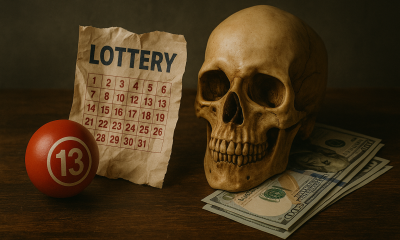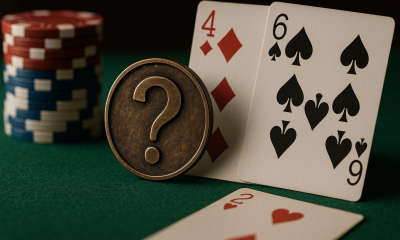Psychology
Anticipation and Reward: The Neuroscience of Gambling Addiction

Gambling stimulates numerous regions of our brain, and it can put you through the full range of emotions during gameplay. We can feel supreme joy, confidence, excitement, as well as remorse, regret, sadness, and even compulsive urges to keep going. And after playing for a while, your emotional and neurological responses will alter.
Understanding the great range of emotions and the neuroscience behind gambling is vitally important. It can help you rationalise what you are feeling, and know when you should stop. Also, with this knowledge, you can avoid gambling addiction, or addictive behaviours in your gambling. Not all players become gambling addicts, but even recreational players can fall into psychological traps and make reckless decisions.
How Anticipation and Reward Stimulates
Let’s go step by step through a round of a casino game, breaking down the emotions and neuroscience behind each step. In the first example, we will examine a slots game. Then, we will look at a game with an element of control, blackjack, and compare how the two can stimulate your brain.
Stimulation in a Game Without the Element of Control
When you play, for example, a game of slots, you have to make a stake, place your bet, and then spin the reels. There is nothing left to do after except wait for the reels to stop spinning and see whether you have won or not. These games are, by design, quite repetitive, with graphics and sounds to stimulate players. Before the reels spin, your brain releases a shot of dopamine, in anticipation of what may happen. It creates a level of excitement and motivates you to test your chances of winning.
Once you press spin, the suspense will build in your body. Your amygdala, which processes emotions, will become active and trigger your fight or flight response. This is the part of your brain that is used to also analyse dangers, and the stress will build up as the reels slow down.
If you win, your brain will flood with dopamine, rewarding you for taking the risk and winning. It is pleasurable, but it can also reinforce the risk taking behaviour, and make you want to try again. Should you lose, you will also get a rush of dopamine, but on a much smaller level. You will also regret your decision and may feel some gambler’s remorse, but this can also prompt you to try again.

Near Misses and Misleading Winner’s High
Should you experience a near miss, your rewards system will activate almost as much as it would if you win. This is one of the most dangerous scenarios, as you don’t actually win (or break even), but still get the same winner’s high. Near misses will prompt players into thinking they are “close to a win”, and most will hit the spin button again.
Slots machines run on complex algorithms, and every single outcome is completely random, therefore the assumption is completely wrong. It is illegal to rig slot machines to make near misses or to rig them in any other way.
Stimulation in a Game With the Element of Control
The element of control brings an additional step to each round. After drawing 2 cards in blackjack, you are presented with the opportunity to influence the outcome. You can hit, stand, double down, split and even surrender in some variants of blackjack. When you are put in that position, it stimulates your prefrontal cortex, the region of the brain responsible for rational decision-making. You have more information about your chances of winning following the initial draw. This could work in your favour, but it can also lead to some players misinterpreting the odds.
Following your action, if it leads directly to a win, you will be hit with a more potent winner’s high. For all purposes, it feels like you have outwitted the house and your decision has given you the victory. Like the win is amplified, so is a loss. You will feel a greater sense of remorse, as your action lost the round.
But in these games, wins and losses are far more nuanced. You could get a bad hand and win by pure luck. Or, you could make the rational decision and still lose. For instance, most basic blackjack strategies tell you to double down on 11. But let’s say you do that and draw a 5. Your hand has a score of 16, and if the dealer can beat it, you will lose double your stake. If you lose a hand where you had the initial advantage, it will create a greater sense of remorse and may even spike your stress levels.

When Your Emotions Take Over Your Better Instincts
The big danger is that regardless of whether you win or lose, there will always be a temptation to try another round. The dopamine that you get after winning or achieving a near miss will beckon you to have another go. After losing, you may feel compelled to test your luck again. Plus, you have the added incentive of trying to win your money back.
After more rounds have passed, these levels of dopamine and cortisol will alter, as your body adapts to the mood swings between anticipation and reward. Another factor will also play into the equation. How much money you have won or lost in previous rounds. The altered dopamine regulation and additional factors can play tricks on your brain’s reward system.
Some players may build cognitive biases during their gaming. These are assumptions that alter their understanding of the mathematical odds of winning, and can produce harmful behaviour. Playing too long can also tire you out quickly, as you continuously go through the motions. Your serotonin levels will drop with the fatigue, and this can lead to poor decision-making and an increased level of anxiety.
Who is at Greater Risk of Gambling Addiction
Playing while you feel anxious or depressed is the worst thing you can do to yourself. Some players gamble to get rid of these negative effects, relying on the dopamine rush to lift their mood or handle their anxiety. This is attempting to abuse the dopamine rush that you get while gambling, and one of the key causes of gambling addiction.
Addicts have problems controlling their impulses, something that is enhanced by low serotonin activity. When they sit down to play a round of slots, they find it hard to quit and often ignore the danger signs until it is too late. Some people don’t have problems with addiction, and can easily quit while they are ahead. Or, know when to accept their losses and take a break.
But some people struggle with this. They fall into psychological traps such as believing they can predict the outcome of a game or beat the house with the right strategy. Even in skill-based games, they may play down the role that luck has to play and believe that they force wins.
People with addictive traits, or known prior addictions, are prone to this type of behaviour. But they are not alone. Studies have also shown that the elderly and young people are also at a greater risk of addiction. This can be through a lack of education or knowledge on the subject matter, or no previous experience of how anticipation and reward can stimulate our rewards system.

Avoiding Addiction to Gambling
It is difficult to define who is an addict and who isn’t, as there are so many different aspects to consider. Psychologists would consider any of the following behaviours to be linked to addiction:
- Frequently thinking about gambling
- Lying about gambling
- Inability to stop playing
- Gambling for escapism or to relieve bad feelings
- Chasing losses and playing until you deplete your bankroll
You will find related questions in gambling self-assessment forms, that help work out whether you have an addiction or problem. Most players don’t have problems with their gaming, but there is a minority who are at risk.
The best way to avoid becoming overwhelmed with your gambling, or taking it to excess is by regulating how much time and money you spend. Gambling sites offer precautionary tools such as reality checks and deposit limits to give you full control of your gambling.
They have proven to be useful to all players, and can definitively prevent people from forming gambling habits. But you should also do your part to learn about the causes of addictions, and how they can be avoided through mindful gaming practises.
Mindful and Responsible Practises
We aren’t saying to constrain yourself from feeling the rollercoaster of emotions. With a little preplanning, you can still enjoy yourself and even zone out but without taking the gaming to an excess.
Setting up win and loss limits, and managing your bankroll is necessary. Before playing, work out how long your gaming session will take, and how much you are going to spend. You can also incentivise your session by setting a target – how much you would like to win before you call it quits. But if you do so, be sure to also set a target for your losses. You will quit once you have lost a certain amount – and stick to the plan.
If you want more detailed or personalised advice, you can always reach out to a gambling help organisation. Institutions such as AGA or the National Council on Problem Gambling continuously research safer gambling practices. They have lots of useful tips and tricks that show you how to play safely and avoid forming addictive habits. Ultimately, gambling should be seen as a source of entertainment, and not a means to make money or manage bad feelings.











